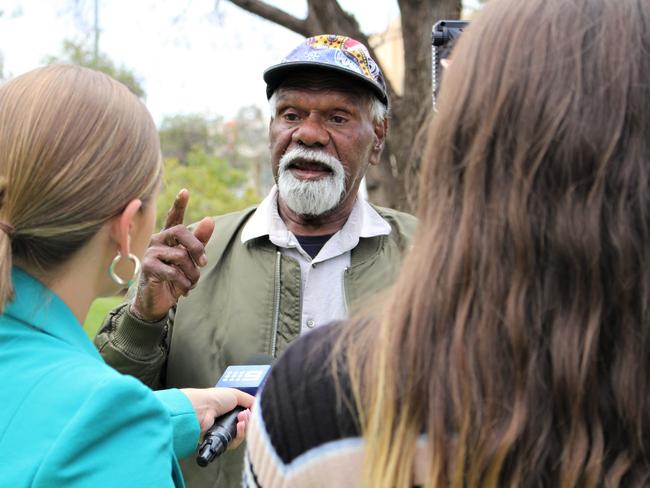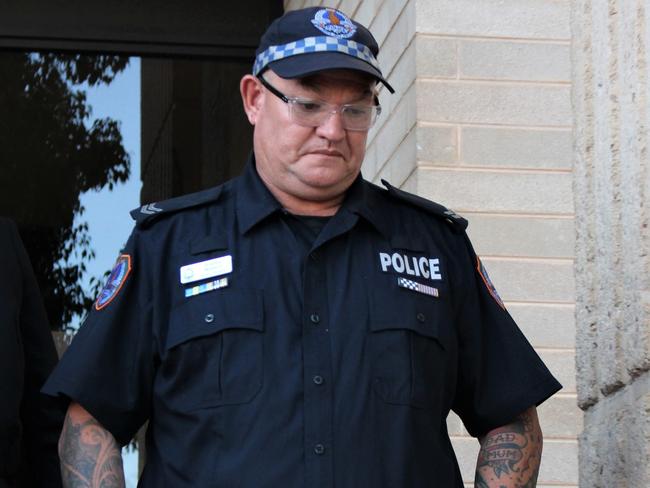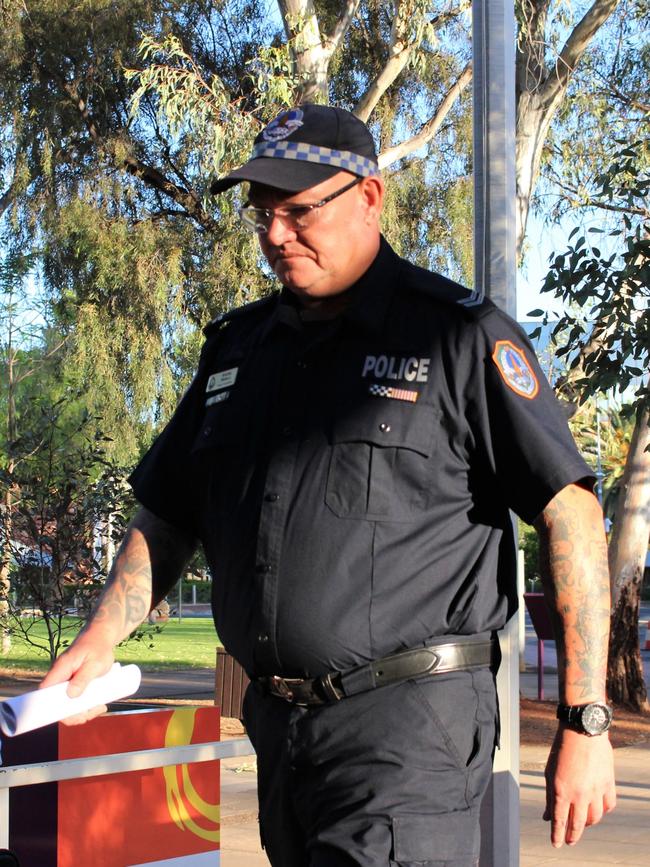Coroner to visit ‘memory house’ as Kumanjayi Walker inquest heads to Yuendumu this month
Territory Coroner Elisabeth Armitage will visit the ‘memory house’ where Kumanjayi Walker was killed when the inquest into his police shooting death tours Yuendumu later this month.
Police & Courts
Don't miss out on the headlines from Police & Courts. Followed categories will be added to My News.
Territory Coroner Elisabeth Armitage will tour significant sites in Yuendumu as part of an ongoing inquest into the death of Kumanjayi Walker, including the “memory house” where he was fatally shot by police.
Zach Rolfe was acquitted on all charges in March over the 19-year-old Warlpiri-Luritja man’s death in November 2019, with the ongoing inquest adjourning for a week on Friday as his family mark the third anniversary of his passing.
When the hearing resumes, up to two dozen lawyers representing Mr Walker’s family, Constable Rolfe and various other parties will make the 300km journey north of Alice Springs.
Barrister for the Parumpurru Committee of Yuendumu, Julian McMahon SC, told the court there had been significant work behind the scenes since Warlpiri elder Robin Japanangka Granites first extended the invitation at the beginning of the inquest in September.
“A lot of people have actually been working to make that hoped visit a reality and it looks like it is now a reality,” he said.
“So the Parumpurru Committee is inviting your honour and everybody here, all of your honour’s staff and all the parties at the bar table to come to Yuendumu.”
Mr McMahon said while the visit would serve several purposes, “perhaps the most important” was “to allow the community to speak to your honour as was foreshadowed on that very first day”.
“So that your honour can hear the voice of the community in a way which is not normally done, and not normally possible in a court proceeding,” he said.
“It’s the hope of the community that through the events that they’ve planned, for your honour and all of us, to share their voice about at least some of the matters that have led into this inquest.”
Mr McMahon said Ms Armitage would first be welcomed on November 14 by elders nearby house 511, where the fatal confrontation occurred, now referred to as “the memory house”.
“Once that’s done, there may be some discussion with your honour about Kumanjayi’s passing from a spiritual perspective and how that is understood in Warlpiri culture,” he said.
A closed “truth telling meeting” is expected to follow and the next morning, Ms Armitage will be shown key locations from the first two months of hearings, including the nurses quarters, airport and police station.

“Various family members will probably walk with your honour and talk with your honour about what the place means to them in the context of the history since November 2019,” Mr McMahon said.
“I expect that to be an opportunity, particularly for individuals most closely connected to these events, just to be able to talk to your honour.”
Finally, Mr McMahon said Ms Armitage would join a yarning circle with elders and Mr Walker’s peers.
“The elders and the younger people will talk to your honour about a whole range of issues to do with Warlpiri culture,” he said.
“It’s not a defined list of issues but we hope that it will include some of the issues that have been raised in the (inquest) by different witnesses either briefly or to some larger extent.
“Things like the nature of grieving and sorry business, and perhaps other aspects of Warlpiri justice which have come up, and Warlpiri culture.”
Before adjourning for the week, Ms Armitage said she would “very gratefully accept” the “incredibly generous invitation”.
“It is a gracious invitation and I take it very much to heart that we are being welcomed into Yuendumu,” she said.
“At the end of this process, however painful the process is, we do hope that we have a sense of hope and I am very pleased to be able to come to the community to listen to the hurt and the pain, but also the plans for the future.
“Normally we expect people to come into this very formal environment, which must be extremely foreign and intimidating to most people who haven’t been to court before, and it will be a very different opportunity for people to speak on their own country.”
On Thursday, the second Aboriginal police officer to give evidence at the inquest in two months spoke of his shock, disgust and hurt at the revelation of racist text exchanges between the man who killed Kumanjayi Walker and other officers.
Zach Rolfe was acquitted on all charges in March over Mr Walker’s death at Yuendumu in 2019, with Territory Coroner Elisabeth Armitage now probing the circumstances of the police shooting in the Alice Springs Local Court.
Eastern Arrernte man Senior Constable Brad Wallace told the court he had first put on the blue uniform in 1998 after growing up “a pretty rough kid” between Darwin and Alice Springs.
“I didn’t always have positive interactions with the police,” he said.
“I joined the police because the conversations that I had with my family members in the 1980s and 1990s were about a lot of the negativity that came with the associated trauma and the dealings that my people had had with the police leading up to obviously my time and the way that we weren’t particularly happy about those interactions.
“And it was pointed out to me that I can march up and down outside the station with a placard all day and what I could achieve may be limited.
“Or I could join and I could attempt to make changes from within.”
But Constable Wallace said he had still “faced racism in the workplace almost daily” when he started his career with the Australian Federal Police almost a quarter of a century ago.
From “derogatory comments” about his father’s marriage to an Aboriginal woman to references to “me being one of the good ones”, he said “it was common in the workplace”.
“Asking me why I spent time outside of work with people of colour who are my family, that was common in policing in the ‘90s within the organisations that I worked for,” he said.
So when the texts emerged, Constable Wallace said he was “disgusted” as a police officer, and “as an Aboriginal man I’m angry and I’m hurt”.
He said both the AFP and the NT Police had “come ahead in leaps and bounds” in employing more Aboriginal people since the 1990s, along with “the diminishing impact of racism in the workplace”.
“But what really impacted me was that after 24 years the same language was being used, albeit on what those members thought was a private platform,” he said.

“I’ve worked with some of the members involved and I’m deeply hurt and disappointed.”
Constable Wallace said while he had not personally experienced racism in the police force in recent years, “that doesn’t diminish how it makes me feel” to read the racial slurs.
“It makes me reflect on how those officers would view my family members walking down the street in their roles and whether they have formed biases about them prior to dealing with them,” he said.
“As a police officer, like I said, I’m disgusted that that type of language was being used on any platform and I’m deeply disappointed that it wasn’t addressed by people that were within leadership roles within that group.”
Constable Wallace said the texts had affected how he was reflected in his own community “as an Aboriginal man wearing this uniform”.
“How my family sees me wearing a uniform that can be associated with racism,” he said.
“It hurts.”
But he said overall, he had not seen much racism in the Alice Springs muster room, if any, despite “frustrations” with “the hardest policing I’ve done in my 24 years” that could lead to “confronting” conversations.
“What I see is a group of people working in an exceptionally challenging environment, trying to do their best to protect this community,” he said.
“I’ve worked in multiple jurisdictions as part of the Australian Federal Police including international, by far the hardest, most brutal workplace that I have worked in is central desert.
“It’s extremely difficult, challenging, confronting, can be very violent and it takes a lot out of you as an individual and coming from this community.
“(Having) family from across the region and dealing with some of those traumas from within my own family group is very confronting.”
Following a series of emotional mea culpas from the witness box, Constable Wallace said he remained hopeful that “attitudes can be changed”, but that didn’t necessarily “mean that there’s a basis there for forgiveness”.
“The first thing I thought when I heard that there were some apologies being given for comments that have been made is ‘Are you sorry you said it? Or are you sorry you got caught?’,” he said.
“So those members may be sorry, but you know, for myself and perhaps for some of the other Aboriginal members within the organisation – and some of our non-Aboriginal staff who try so hard to build those bridges with the community and work effectively – the damage is there.”
Constable Wallace said while “the banter day to day that I see in the workplace is totally different” now, compared with two decades ago, the “disgusting, horrible” language in the texts “shocked me and it hurt me, but it didn’t surprise me”.

“We’re a representation of mainstream Australia in the police, so where I think it can be positive is that it has been raised in this inquest that Northern Territory police are aware of it, and that we acknowledge that we don’t accept it, we don’t tolerate it, and that we will not have that as part of this organisation, this uniform,” he said.
“Which is why it’s so disappointing, that some of the stuff in this inquest has come to light, because we don’t see that, or I don’t see that, day to day, and if I did, I certainly wouldn’t tolerate it.”
Moving forward, Constable Wallace said addressing racism was “a conversation that has to happen” with new recruits to try and stamp out its scourge in the force at its root.
“The only way to address issues within our own community is to be honest and courageous and sometimes have conversations that none of us feel comfortable with,” he said.
“That’s how my mother, my grandmother and every Aboriginal person in Australia’s ancestors going back to the time of colonisation have dealt with what’s happened to them and what’s put us in the position we are now, where we’re moving forwards and there’s a future ahead of us.
“From the time my mother was a member of the Stolen Generation, my mum came home to her own country, my mother was confronted with racism.
“For things to have moved forward from her time to my time, it’s had to have been courageous and honest. I think it needs to continue.”
The inquest will resume in the Alice Springs Local Court on November 16.





